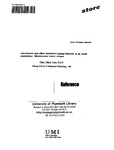Attachment and affect motivated eating behavior in an obese population: Maintenance versus relapse
| dc.contributor.author | Celec, Mary Jean | |
| dc.contributor.other | Faculty of Health | en_US |
| dc.date.accessioned | 2013-11-19T08:38:11Z | |
| dc.date.available | 2013-11-19T08:38:11Z | |
| dc.date.issued | 1994 | |
| dc.identifier | NOT AVAILABLE | en_US |
| dc.identifier.uri | http://hdl.handle.net/10026.1/2740 | |
| dc.description.abstract |
This dissertation explored object relations characteristics in an obese population by comparing those who relapse following treatment with those who maintain their weight losses following treatment. The impetus for this study came from the proliferation, in recent years, of weight loss programs whose long-term results have been dismal. This all-too-common trend of relapse only serves to perpetuate the negative physical and psychological concominants of obesity. This dissertation presented a psychodynamic approach to conceptualizing relapse in weight loss and conducted a preliminary exploration in an effort to glean same information to confirm or disconfirm the usefulness of this approach. Theoretically, disruptions in early attachment, through empathic failures on the part of the selfobject, interfere with internalization of self-soothing structures. consequently, when the self experiences intolerable affect, the self initiates some action to ameliorate it. In the case of obesity, the self eats compulsively. This dynamic plays a role in relapse. Assessing the theoretical concepts presented through the Bell Object Relations Inventory with particular attention to the Insecure Attachment subscale, this study proposed that those who relapsed would show greater object relations deficits than those who maintained their weight losses and that those who reported emotional eating would show greater deficits on the Insecure Attachment subscale than those who did not. The subjects included in this study were thirty-nine caucasian females who had participated in a modified fasting diet. The study contacted the subjects through mailed surveys. It analyzed the data collected through the use of a t-test. Results did not show a significant difference between the relapse and maintenance groups. However, a significant difference appeared on the Insecure Attachment subscale when it compared emotional eaters to non-emotional eaters. This finding was consistent with the theoretical link between affect motivated eating behavior and the quality of object relations. | en_US |
| dc.language.iso | en | en_US |
| dc.publisher | University of Plymouth | en_US |
| dc.title | Attachment and affect motivated eating behavior in an obese population: Maintenance versus relapse | en_US |
| dc.type | Thesis | |
| plymouth.version | Full version | en_US |
| dc.identifier.doi | http://dx.doi.org/10.24382/3773 |
Files in this item
This item appears in the following Collection(s)
-
01 Research Theses Main Collection
Research Theses Main


